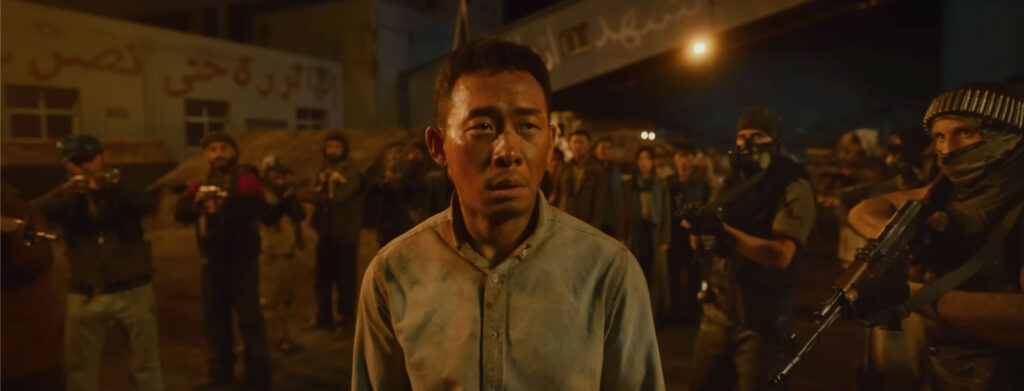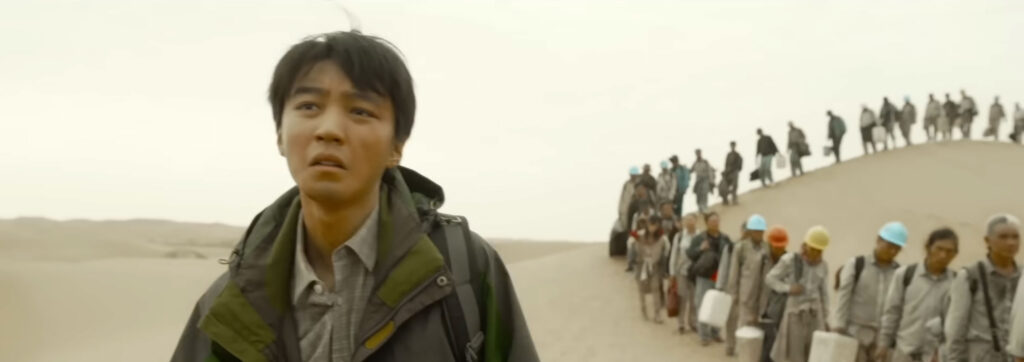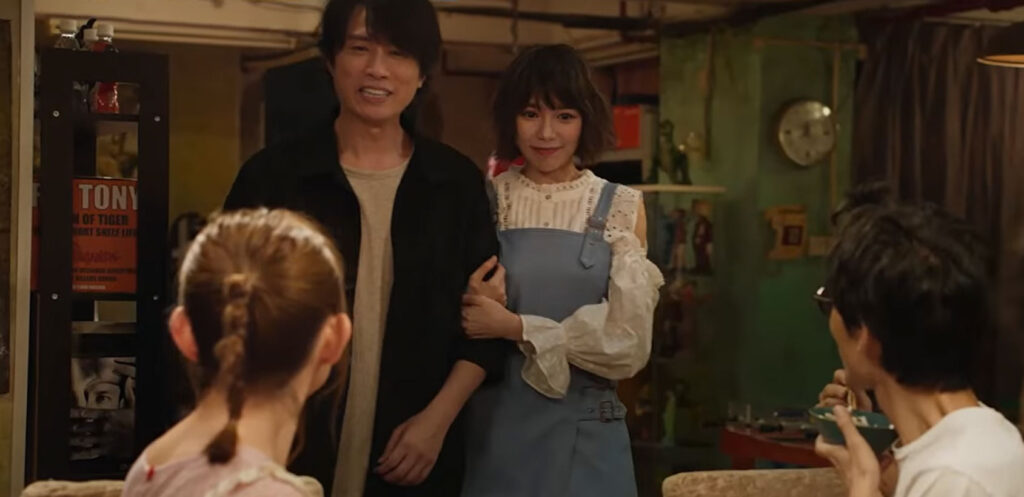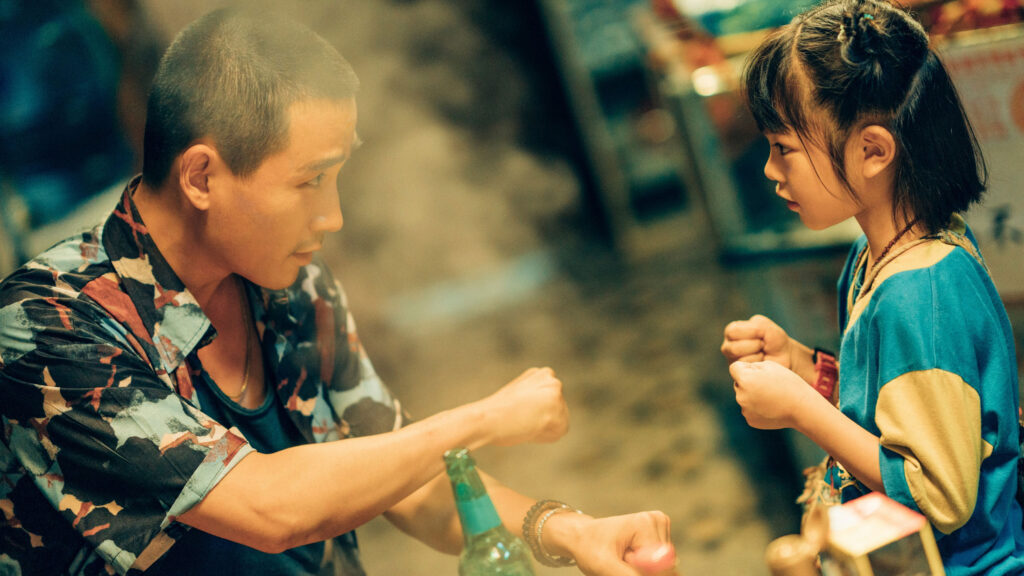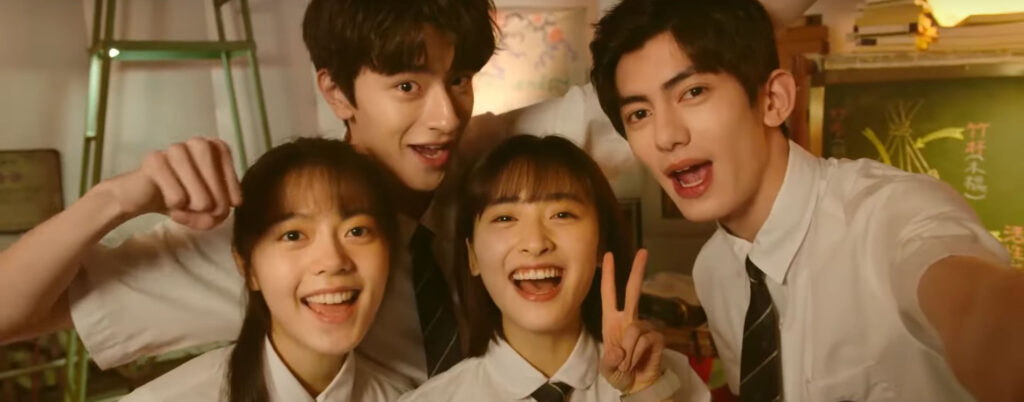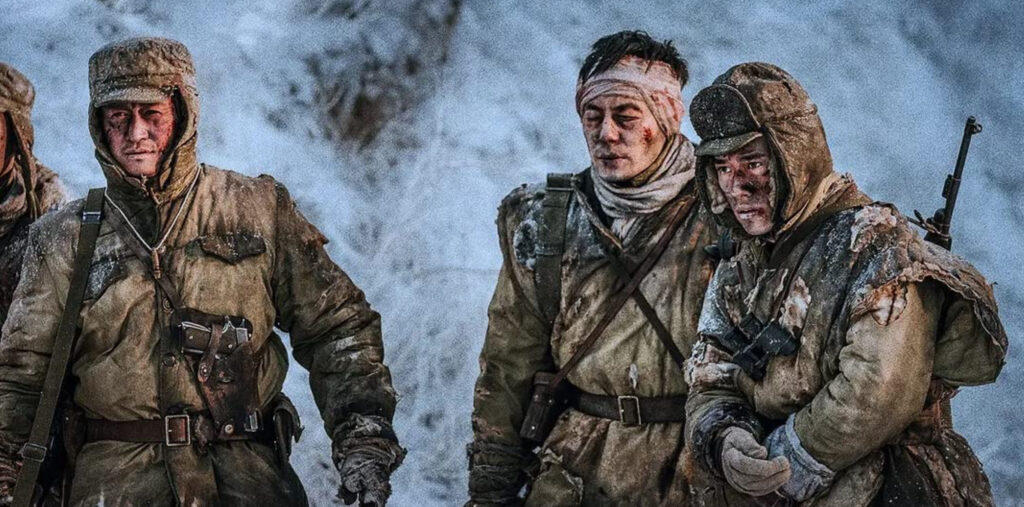December 26, 2022
by Carla Hay

Directed by Zhang Luan
Mandarin with subtitles
Culture Representation: Taking place in China in 2021, the 1980s and 1991, the sci-fi comedy/drama film “Give Me Five” features an all-Asian cast of characters representing the working-class, middle-class and wealthy.
Culture Clash: After his 60-year-old father ends up in a hospital and is experiencing memory loss, a 30-year-old man unexpectedly finds out that he can travel back in time to the 1980s, where he meets his parents before they got married.
Culture Audience: “Give Me Five” will appeal primarily to people who are interested in watching amusing and occasionally poignant stories about time travel and family relationships.

“Give Me Five” is a convoluted but overall entertaining comedy/drama that will get inevitable comparisons to “Back to the Future,” because of the plot about time travel that could affect the courtship of a man’s parents. The movie is good, but not great. The main difference between the two movies’ plots is that the protagonist in “Back to the Future” is aided by an eccentric scientist, whereas there is no such scientist character in “Give Me Five.”
Directed by Zhang Luan and written by Dong Tianyi, “Give Me Five” begins in 2021, with the introduction of the movie’s protoganst: Wu Xiao, also known as Xioawu (played by Chang Yuan), is a 30-year-old business entrepreneur in an unnamed city in China. After graduating from college, Xiao founded an e-sports training company that is struggling to be a financial success. Xiao has a volatile relationship with his widowed father Wu Hongqi (played by Wei Xiang), who is 60 years old and a retired engineer. Hongqi calls Xiao “useless” for hanging out at Internet cafes all day.
Xiao’s mother died in childbirth. Hongqi, who is a retired engineer, raised Xiao (who is an only child) and never remarried. Xiao says in a voiceover early in the movie: “He might have brought me up, but he’s never liked me. It’s as though we are arch-enemies.” Making things more complicated, Hongqi has been experiencing short-term memory loss, and he sometimes calls Xiao his “brother.”
Early in the movie, there’s another example of how Hongqi is forgetful. On Xiao’s birthday, Honqi asks Xiao to make a wish when Xiao blows out candles on his birthday cake. Xiao asks Honqi for ¥5,000 because Xiao wants to propose to his girlfriend Huahua, and he needs the money for the wedding. Honqi gives Xiao the money but then immediately forgets why. Xiao gets angry and yells at Honqi that if he and Huahua get married, they will be burdened with taking care of Honqi.
Tragedy strikes when Honqi accidentally falls into a river and ends up in a coma, in a hospital. Xiao is worried about his father. But because of their strained relationship, Xiao also complains to his comatose father that they can’t afford the hospital bill.
Honqi’s former co-worker named Qin Shiyu (played by Huang Yuntong), who is a female friend of his, visits Honqi in the hospital. She tells Xiao that when Honqi was younger, he liked Rabindranath Tagore’s poems, which Shiyu reads to Honqi in the hospital. This admiration for Rabindranath Tagore poetry becomes a key point in the movie’s plot.
Back at his family home, Xiao finds a ring, his mother’s diary and a bank account book showing a balance of ¥5,000. He opens the diary to find an entry dated May 30, 1986. And when Xiao, he finds himself transported back to that date. He ends up meeting his parents before they got married.
The rest of the movie shows Xiao traveling back and forth in time from the 1980s to 1991. He can control when he goes back in time, but he doesn’t know when he will be pulled back to the present day. During his time traveling, Xiao finds out that Honqi and Shiyu used to date each other when they were factory co-workers in the 1980s. At the time, Xiao’s mother Lau Chunli (played by Ma Li), also known as Daliu, was a technician at the same factory.
Because his parents don’t know that Xiao is their future son, Xiao presents himself as a new employee. Xiao ends up befriending Honqi, who is nerdy and very insecure about his relationship with Shiyu, who is ambitious and glamorous. Honqi thinks that Shiyu is out of his league and is afraid that she will break up with him.
Daliu is socially awkward and a little bit of a misfit at the factory. She has a crush on Honqi, but he’s so caught up in his relationship with Shiyu that he doesn’t immediately notice how Daliu feels about him. Meanwhile, a former co-worker named Qiang (played by Jia Bing), who was fired from the factory for stealing coal, reappears as a shady businessman with enough money to buy the factory. Qiang wants to make this purchase, but he if he buys the factory, then 2,000 employees will be laid off.
Once the time traveling part of “Give Me Five” happens, most of the movie is about how Xiao handles the love triangle between Honqi, Daliu and Shiyu. Should he interfere? And if he does, could it possibly prevent himself from being born? This time-travel experience also makes Xiao see his father in a different way. Xiao discovers that his father was a lot less confident in his 20s, compared to how Xiao perceived his father to be more self-assured when Honqi was that age.
“Give Me Five” has some deliberately goofy scenarios, and the film derives a lot of comedy from hairstyles, fashion and music from the 1980s. Some of the jokes are a little repetitive but nothing in this movie is so substandard that it’s a turnoff. The performances are engaging enough, with Chang showing talent in carrying most of the movie with his skills in comedy and drama. Even if people who’ve seen these types of movies can easily predict what will happen at the end, “Give Me Five” is sentimental without being too mawkish in its message about appreciating loved ones while they’re still alive and not misjudging them.
Well Go USA released “Give Me Five” in select U.S. cinemas on September 23, 2022.

